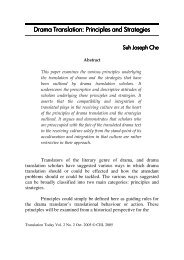Re-Evaluation of Lin Shu (the Chinese Translator) - National ...
Re-Evaluation of Lin Shu (the Chinese Translator) - National ...
Re-Evaluation of Lin Shu (the Chinese Translator) - National ...
You also want an ePaper? Increase the reach of your titles
YUMPU automatically turns print PDFs into web optimized ePapers that Google loves.
Xu Jianzhong 155ideas <strong>of</strong> that society. Intellectuals at that time expressed <strong>the</strong>irpatriotism in various ways to make <strong>the</strong> nation strong. Under <strong>the</strong>influence <strong>of</strong> “learning from <strong>the</strong> West” and bringing <strong>the</strong> socialfunction <strong>of</strong> novels into play, <strong>Lin</strong> <strong>Shu</strong> started his translation career.Just at <strong>the</strong> end <strong>of</strong> <strong>the</strong> nineteenth century, <strong>Lin</strong> <strong>Shu</strong> had his <strong>Chinese</strong>version <strong>of</strong> La dame aux camelias by Alexandra Dumas Filspublished. It was <strong>the</strong> first influential fictional translation in China.To a certain degree, <strong>the</strong> novel was anti-feudal, that is, against <strong>the</strong>rigid social stratification, which got a ready response among <strong>Chinese</strong>youngsters fettered by <strong>the</strong> feudal ethics. Since 1903, <strong>Lin</strong> <strong>Shu</strong>successively translated three novels with wars as <strong>the</strong> main content.He thought it was <strong>the</strong> shame <strong>of</strong> French defeat in Waterloo thatinspired French to master knowledge and <strong>the</strong>n made France avoid<strong>the</strong> loss <strong>of</strong> national sovereignty (Zhang Juncai, 1992: 98). <strong>Lin</strong> <strong>Shu</strong>tried to tell readers that <strong>Chinese</strong> should be ashamed <strong>of</strong> nationaldefeats and weakness so as to make efforts for <strong>the</strong> prosperity <strong>of</strong> <strong>the</strong>country. <strong>Lin</strong>’s <strong>Chinese</strong> version <strong>of</strong> Ivanhoe was a broad hint for<strong>Chinese</strong> because at <strong>the</strong> turn <strong>of</strong> <strong>the</strong> twentieth century <strong>Chinese</strong> had <strong>the</strong>same experience with Anglo-Saxons. Through his <strong>Chinese</strong> version<strong>of</strong> Le tour de la France par deux enfants (1907) he hoped that<strong>Chinese</strong> youngsters could promote industry to build up nationalstrength so as to save <strong>the</strong> nation from being defeated. He alsoproduced Ai Si Lan Qing Xia Zhuan (<strong>the</strong> <strong>Chinese</strong> version <strong>of</strong> EricBrighteyes), Shi Zi Jun Ying Xiong Ji (<strong>the</strong> <strong>Chinese</strong> version <strong>of</strong> TheTalisman) and Jian Di Yuan Yang (<strong>the</strong> <strong>Chinese</strong> version <strong>of</strong> TheBetro<strong>the</strong>d) to spread martial spirit in China so that <strong>Chinese</strong> couldfight bravely against foreign invaders.In short, <strong>the</strong> translated works by <strong>Lin</strong> <strong>Shu</strong> greatly reflected <strong>the</strong>ideology <strong>of</strong> reform and enlightenment so as to streng<strong>the</strong>n <strong>the</strong> nation.As he expressed in preface to Bu Ru Gui (a novel translated fromJapanese) he translated foreign fictions to waken <strong>Chinese</strong> populaceto save <strong>the</strong> nation (Guo Yanli 1998: 209).
















